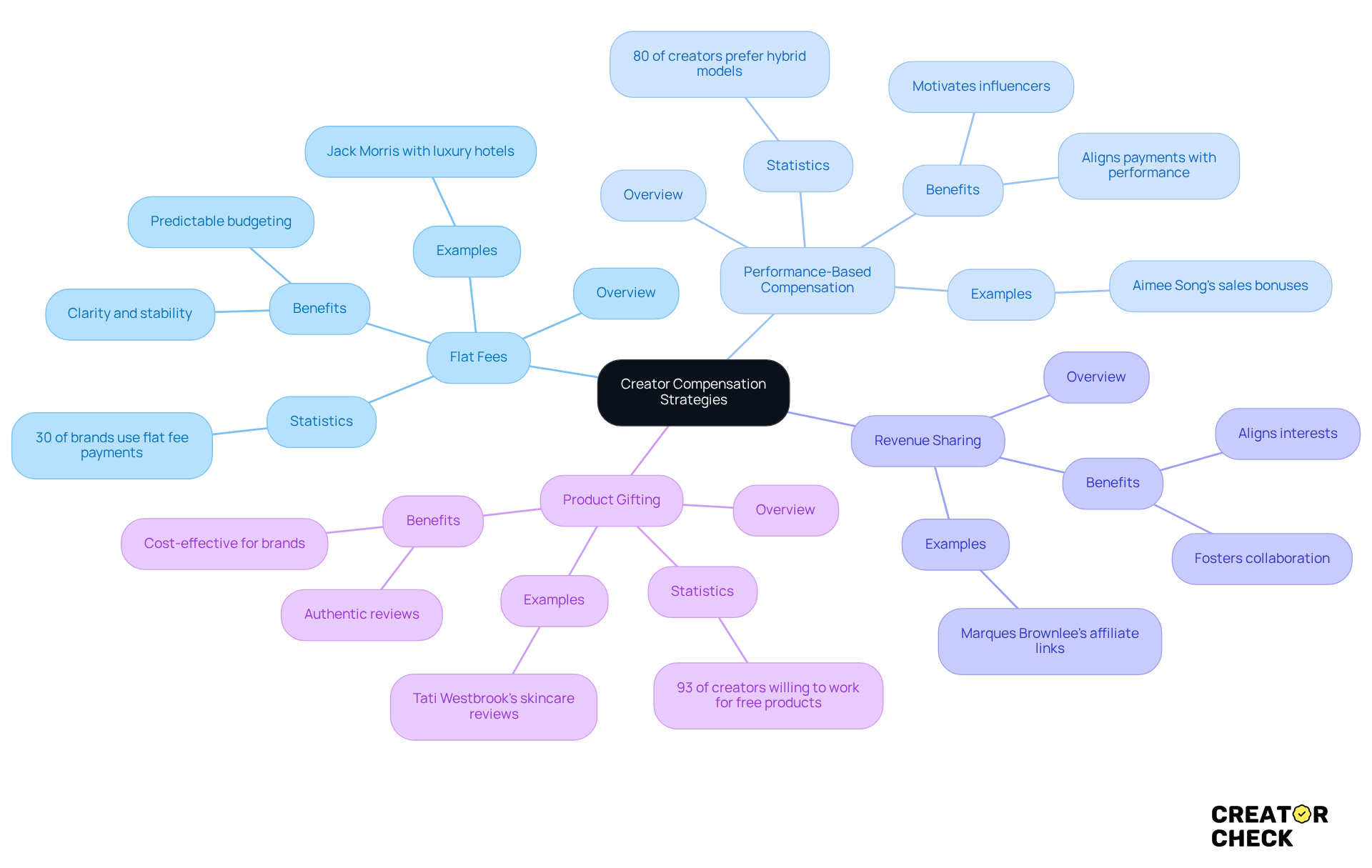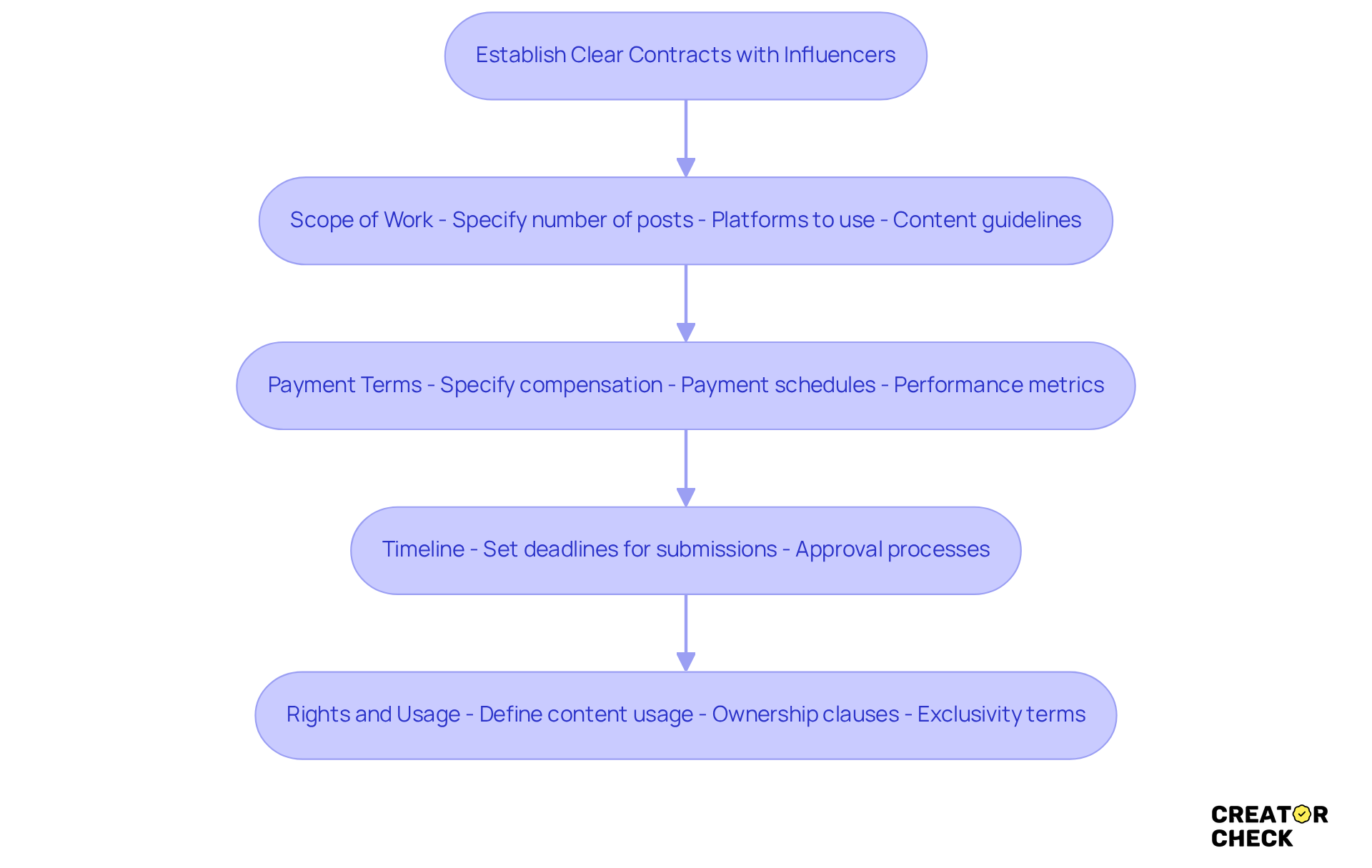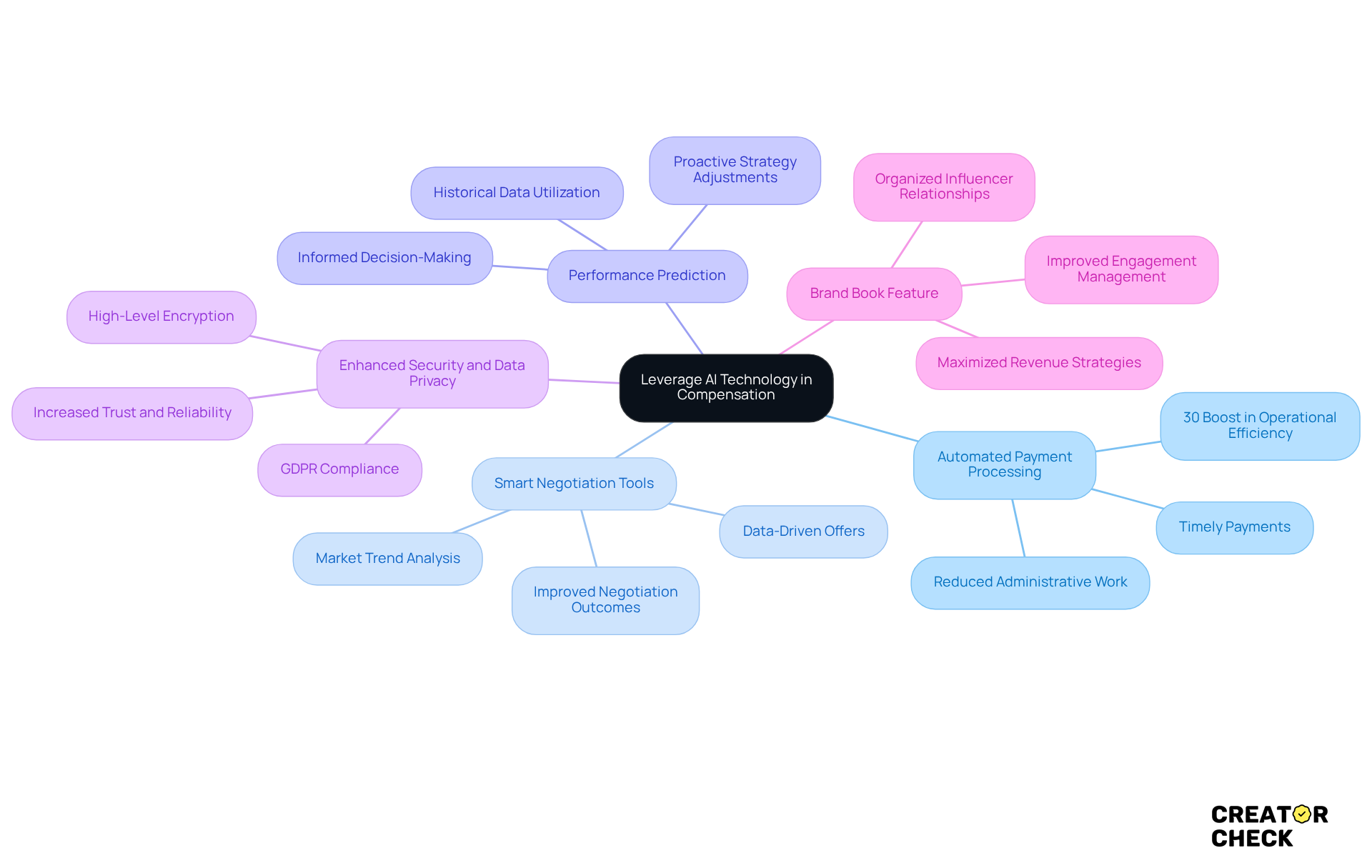Overview
This article dives into four key creator compensation strategies that influencer agencies can use to boost their revenue:
- Flat fees
- Performance-based compensation
- Revenue sharing
- Product gifting
Each strategy comes with its own set of evidence and examples, showing how they can amp up influencer motivation and agency profitability. Plus, it’s essential to highlight the importance of clear contracts and how integrating AI technology can really streamline payment processes.
So, what does this mean for you? Well, these strategies not only make financial sense but also foster a more motivated and engaged influencer community. By implementing these approaches, you can create a win-win situation for both your agency and the creators you work with.
Let’s dive into each strategy a bit more. You’ll see how they can transform your compensation model and ultimately lead to greater success for everyone involved!
Introduction
In the fast-paced world of influencer marketing, agencies are up against the challenge of creating effective compensation strategies that meet the diverse needs of creators while also boosting revenue. By checking out different compensation models—from flat fees to performance-based incentives—agencies can uncover fresh ways to motivate influencers and foster collaboration.
But how can agencies find that sweet spot between fair compensation and sustainable profitability in such a competitive market? Let’s dive into four key strategies that empower influencer agencies to fine-tune their compensation approaches and thrive in this ever-evolving industry.
- Explore various compensation models.
- Implement performance-based incentives.
- Foster collaboration through transparent communication.
- Regularly evaluate and adjust compensation strategies.
Explore Diverse Compensation Models for Influencers
Influencer firms should consider implementing creator compensation strategies for influencer agencies to maximize revenue while meeting the diverse needs of creators. The effectiveness of these models can really impact both influencer motivation and agency revenue. Let’s take a look at some common compensation structures:
- Flat Fees: This straightforward approach involves paying influencers a set amount for their services, making it perfect for predictable budgeting. Did you know that around 30% of brands use flat fee payments? They provide clarity and stability for both parties.
- Performance-Based Compensation: This model ties payments to specific metrics, like engagement rates or sales conversions, motivating influencers to boost their performance. Research shows that 80% of creators prefer hybrid models that mix flat fees with performance incentives, offering both income stability and the chance for higher earnings. Creator Check's efficient management capabilities can help organizations track these metrics effectively, ensuring that performance-based compensation is calculated accurately.
- Revenue Sharing: Agencies can also adopt a revenue-sharing model, giving content creators a percentage of sales generated through their promotions. This aligns interests and fosters a collaborative environment. For instance, tech reviewer Marques Brownlee effectively uses affiliate links to earn commissions, showcasing the potential of this model. With Creator Check, organizations can manage these relationships and track sales data securely, all while complying with GDPR and other data protection standards.
- Product Gifting: Providing products in exchange for promotion can be especially effective, particularly for micro-influencers who often prefer tangible rewards over cash. This strategy not only reduces direct monetary costs for brands but also leads to authentic reviews, as individuals are more likely to endorse products they genuinely appreciate. Creator Check makes it easy for organizations to handle these product exchanges effectively, ensuring that all communications remain secure and adhere to data privacy regulations.
By exploring various creator compensation strategies for influencer agencies to maximize revenue, organizations can create customized packages that resonate with different influencers, ultimately leading to stronger collaborations and enhanced revenue potential. Plus, using Creator Check can simplify these operations, ensuring that organizations manage their influencer relationships effectively while maintaining data privacy and security through enterprise-grade encryption. This way, agencies can focus on securing brand deals instead of getting bogged down in administrative tasks.

Establish Clear Contracts and Expectations with Influencers
Agencies really need to focus on crafting clear and comprehensive contracts with influencers. This not only helps maximize revenue but also minimizes potential disputes. So, what are the essential elements to consider?
- Scope of Work: It’s crucial to clearly outline what you expect from the influencer. This means specifying the number of posts, the platforms they'll use, and any particular content guidelines. Getting this right helps prevent misunderstandings and ensures everyone is on the same page.
- Payment Terms: Be sure to specify how the influencer will be compensated. This includes payment schedules and any performance metrics that might affect payment. Steering clear of lump-sum payments can help you maintain leverage in case things don’t go as planned, ensuring timely compensation for the work completed.
- Timeline: Setting deadlines for content submission and campaign launch is key to keeping things on track. This involves establishing clear expectations for turnaround times and approval processes, which can really streamline collaboration.
- Rights and Usage: It’s important to define how the content can be used by your organization and the brand. This includes any exclusivity clauses. Clearly stating ownership and usage rights can help avoid legal headaches and foster a more productive relationship.
By making sure that contracts are thorough and clear, organizations can cut down on risks, enhance collaboration with influencers, and implement creator compensation strategies for influencer agencies to maximize revenue, ultimately achieving better results for their campaigns. Remember, a little clarity goes a long way!

Implement Performance Tracking to Optimize Compensation Strategies
To enhance creator compensation strategies for influencer agencies to maximize revenue, organizations need to develop performance tracking systems that prioritize data security and privacy. Let’s break down some key components:
- Analytics Tools: Think about employing platforms that provide essential insights into engagement rates, reach, and conversion metrics for your influencer campaigns. These tools help you evaluate how effective your collaborations are and identify your top-performing advocates, all while keeping data safe with enterprise-grade encryption and GDPR compliance.
- Regular Reviews: How often do you check in on your campaign performance? Conducting periodic evaluations can help you spot trends and identify areas for improvement. This proactive approach allows you to adapt your strategies in real-time, ensuring you achieve the best outcomes while keeping sensitive information confidential.
- Feedback Mechanisms: It’s important to foster a collaborative environment. Encourage key individuals to share their thoughts and experiences regarding remuneration. This feedback is invaluable for refining your strategies and strengthening relationships, all while respecting their data privacy.
By leveraging performance data, agencies can implement creator compensation strategies for influencer agencies to maximize revenue, allowing them to make informed decisions about salary adjustments and remain competitive and appealing to top talent. This data-driven approach not only maximizes revenue potential but also fortifies partnerships within the influencer marketing ecosystem, all backed by solid security measures.
![]()
Leverage AI Technology to Streamline Compensation Processes
Agencies should really think about integrating AI technology into their payment processes—it can unlock some serious advantages! Let’s break down the key benefits:
- Automated Payment Processing: AI makes the payment process a breeze, ensuring that influencers receive their payments on time and accurately, while also cutting down on administrative headaches. This efficiency is super important; studies show that companies using AI for payment automation can see up to a 30% boost in operational efficiency. Pretty impressive, right?
- Smart Negotiation Tools: AI-driven platforms can analyze market trends and past data to suggest the best remuneration offers, which really enhances negotiation outcomes. This data-driven approach not only improves the quality of offers but also makes sure they’re in line with current market conditions, leading to better deals for influencers.
- Performance Prediction: By tapping into historical data, AI can predict campaign outcomes, which allows organizations to tweak their payment strategies proactively. This predictive ability means you can make more informed decisions, ensuring that compensation matches expected results.
- Enhanced Security and Data Privacy: With Creator Check, security is a top priority. The platform uses high-level encryption to protect confidential data, ensuring that access is tightly controlled by your organization. Plus, compliance with GDPR and other data protection standards boosts trust and reliability when managing influencer data.
- Brand Book Feature: The Brand Book feature helps organizations keep a clear overview of their influencer relationships, making all relevant information easy to access and organized. This functionality supports better management of creator compensation strategies for influencer agencies to maximize revenue and influencer engagement.
Adopting AI technology simplifies payment procedures and enhances creator compensation strategies for influencer agencies to maximize revenue, ultimately improving overall operational effectiveness for both organizations and their influencers. And don’t forget, setting up a dedicated tech stack is key to effectively leveraging these AI capabilities. This way, agencies can truly take advantage of everything AI has to offer in their creator compensation strategies for influencer agencies to maximize revenue. So, what are you waiting for?

Conclusion
Exploring diverse creator compensation strategies is super important for influencer agencies looking to boost their revenue and build strong relationships with content creators. By rolling out tailored compensation models, agencies can meet the unique needs of influencers while ramping up engagement and effectiveness in their campaigns.
So, what are some of these key compensation structures? The article points out a few, like:
- Flat fees
- Performance-based incentives
- Revenue sharing
- Product gifting
Each model has its own perks that can really motivate influencers and align their goals with those of the agency. Plus, having clear contracts and expectations, along with solid performance tracking systems, can help minimize misunderstandings and disputes. This ultimately leads to more successful collaborations.
And let’s not forget about AI technology! Incorporating it can really streamline compensation processes, ensuring timely payments and data-driven decision-making. By embracing these innovative strategies, influencer agencies can not only optimize their compensation frameworks but also create a more secure and efficient operational environment. Remember, adapting to these evolving practices is key; agencies that leverage these insights will definitely be in a better spot to thrive in the competitive world of influencer marketing.
Frequently Asked Questions
What are the common compensation models for influencers?
Common compensation models for influencers include flat fees, performance-based compensation, revenue sharing, and product gifting.
What is the flat fee compensation model?
The flat fee compensation model involves paying influencers a predetermined amount for their services, providing clarity and stability for both brands and influencers. Approximately 30% of brands use this approach.
How does performance-based compensation work?
Performance-based compensation ties payments to specific metrics, such as engagement rates or sales conversions, motivating influencers to enhance their performance. Many creators prefer hybrid models that combine flat fees with performance incentives.
What is the revenue-sharing model for influencers?
The revenue-sharing model allows content creators to earn a percentage of the sales generated through their promotions, aligning interests and fostering collaboration. This model is exemplified by tech reviewer Marques Brownlee, who uses affiliate links for commissions.
How does product gifting as a compensation strategy work?
Product gifting involves providing products to influencers in exchange for promotion, which can be particularly appealing to micro-influencers. This method often leads to authentic reviews and reduces direct monetary costs for brands.
How can Creator Check assist in managing compensation models?
Creator Check helps organizations track performance metrics for performance-based compensation, manage revenue-sharing relationships, and oversee product exchanges securely, ensuring compliance with data protection standards.
Why is it important for agencies to explore diverse compensation strategies?
Exploring diverse compensation strategies allows agencies to create customized packages that resonate with different influencers, leading to stronger collaborations and enhanced revenue potential.




